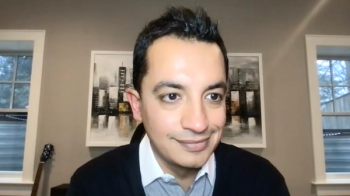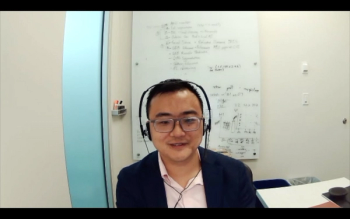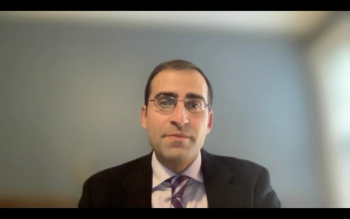
Geoffrey Boyce, CEO of Array Behavioral Care, discusses Array AtHome’s telebehavioral health services, which are now available to approximately 5 million Humana Medicare Advantage members.

Geoffrey Boyce, CEO of Array Behavioral Care, discusses Array AtHome’s telebehavioral health services, which are now available to approximately 5 million Humana Medicare Advantage members.

Edward W. Cowen, MD, MHSc, senior clinician and acting branch chief, Dermatology Branch, National Institutes of Health, discusses treatment considerations for patients with different types of pustular psoriasis.

Sunil Verma, MD, senior vice president and global head of oncology, medical at AstraZeneca, explains the design of the HIMALAYA study, including the dosing strategy used.

Megan Olsen, MPH, principal at Avalere, provides a comprehensive overlook into the many ways that the COVID-19 pandemic has impacted the cell and gene therapy space.

Aaron Lee, MD, an associate professor of ophthalmology at the University of Washington, discusses some limitations of artificial intelligence (AI) in the ophthalmology field.

Edward W. Cowen, MD, MHSc, senior clinician and acting branch chief, Dermatology Branch, National Institutes of Health, speaks on cytokines involved in the pathophysiology in pustular psoriasis and off-label therapy use.

On this episode of Managed Care Cast, we interview the lead author of a paper in the Health IT issue of The American Journal of Managed Care.

Stephen Schleicher, MD, MBA, and Natalie Dickson, MD, discuss their new roles as chief medical officer (CMO) and chief strategy officer (CSO), respectively, at Tennessee Oncology.

On this episode of Managed Care Cast, Mark Miller, PhD, the executive vice president of health care at Arnold Ventures, outlines what Americans can expect from the newly enacted No Surprises Act.

Victoria Ly, MD, MPH, explains potential next steps for her research on vision screening follow-up rate disparities among children in Arkansas.

Can daratumumab be taken safely as a maintenance therapy? Will quadruplet therapy become more common in the treatment of newly diagnosed multiple myeloma (NDMM)?

Robert Rifkin, MD, FACP, a medical oncologist and hematologist at Rocky Mountain Cancer Centers, outlines multiple myeloma research he hopes to see in the next 5 years.

Judith Lavrich, MD, and Jordan Hamburger outline next steps for their research on virtual learning and pediatric eye health.

For patients with multiple myeloma (MM) who are not eligible for transplant, should novel treatments be used right away? Or should clinicians save the best potential therapies for relapses, which are inevitable with this disease?

Steven Pergam, MD, MPH, director of infection prevention at Seattle Cancer Care Alliance and infectious disease physician at Fred Hutchinson Cancer Research Center, describes the shifts in COVID-19 recommendations for patients with cancer and those receiving CAR T-cell therapy.

Theresa Juday, RPh, director, Specialty Product Development, CVS Health, discusses the potential of cognitive behavioral therapy to address health disparities in underserved communities.

Steven Pergam, MD, MPH, director of infection prevention at Seattle Cancer Care Alliance and infectious disease physician at Fred Hutchinson Cancer Research Center, discusses the National Comprehensive Cancer Network's (NCCN) preference for mRNA vaccines and how they work differently.

Robert Rifkin, MD, FACP, a medical oncologist and hematologist at Rocky Mountain Cancer Centers, discusses his research using real-world data from patients with triple-class refractory multiple myeloma.

Kimberly Westrich, MA, vice president of health services research at the National Pharmaceutical Council, discusses opportunities for growth regarding value-based benefits.

David Yeomans, PhD, associate professor of anesthesiology, perioperative, and pain medicine at Stanford University School of Medicine, discusses the challenges of evaluating pain associated with migraine.

Steven Pergam, MD, MPH, director of infection prevention at Seattle Cancer Care Alliance and infectious disease physician at Fred Hutchinson Cancer Research Center, explains the National Comprehensive Cancer Network (NCCN) update on COVID-19 vaccines and prevention.

David Ramsey, MD, PhD, MPH, outlines what may have contributed to patients' decisions to return to in-person eye care following a telehealth appointment.

This 8-part conversation with Blue Cross and Blue Shield of North Carolina and Newton Family Physicians, moderated by The American Journal of Managed Care® (AJMC®), focuses on the role of value-based care, independent care practices, and other aspects of health care that have been and continue to be affected by the continuing COVID-19 pandemic, even as we enter 2022. This is part 8.

This 8-part conversation with Blue Cross and Blue Shield of North Carolina and Newton Family Physicians, moderated by The American Journal of Managed Care® (AJMC®), focuses on the role of value-based care, independent care practices, and other aspects of health care that have been and continue to be affected by the continuing COVID-19 pandemic, even as we enter 2022. This is part 7.

This 8-part conversation with Blue Cross and Blue Shield of North Carolina and Newton Family Physicians, moderated by The American Journal of Managed Care® (AJMC®), focuses on the role of value-based care, independent care practices, and other aspects of health care that have been and continue to be affected by the continuing COVID-19 pandemic, even as we enter 2022. This is part 5.

This 8-part conversation with Blue Cross and Blue Shield of North Carolina and Newton Family Physicians, moderated by The American Journal of Managed Care® (AJMC®), focuses on the role of value-based care, independent care practices, and other aspects of health care that have been and continue to be affected by the continuing COVID-19 pandemic, even as we enter 2022. This is part 5.

This 8-part conversation with Blue Cross and Blue Shield of North Carolina and Newton Family Physicians, moderated by The American Journal of Managed Care® (AJMC®), focuses on the role of value-based care, independent care practices, and other aspects of health care that have been and continue to be affected by the continuing COVID-19 pandemic, even as we enter 2022. This is part 4.

This 8-part conversation with Blue Cross and Blue Shield of North Carolina and Newton Family Physicians, moderated by The American Journal of Managed Care® (AJMC®), focuses on the role of value-based care, independent care practices, and other aspects of health care that have been and continue to be affected by the continuing COVID-19 pandemic, even as we enter 2022. This is part 3.

This 8-part conversation with Blue Cross and Blue Shield of North Carolina and Newton Family Physicians, moderated by The American Journal of Managed Care® (AJMC®), focuses on the role of value-based care, independent care practices, and other aspects of health care that have been and continue to be affected by the continuing COVID-19 pandemic, even as we enter 2022. This is part 2.

This 8-part conversation with Blue Cross and Blue Shield of North Carolina and Newton Family Physicians, moderated by The American Journal of Managed Care® (AJMC®), focuses on the role of value-based care, independent care practices, and other aspects of health care that have been and continue to be affected by the continuing COVID-19 pandemic, even as we enter 2022. This is part 1.

259 Prospect Plains Rd, Bldg H
Cranbury, NJ 08512
© 2025 MJH Life Sciences®
All rights reserved.
